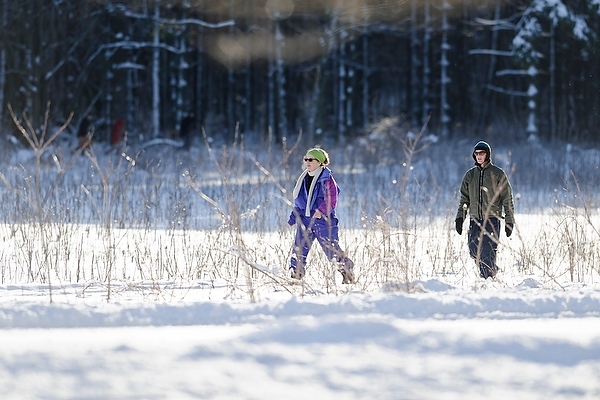Thriving, rather than surviving, is key to winning winter

Try ice skating, cross-country skiing or, like these outdoors-lovers, snowshoeing through the Arboretum to help get you through winter happier and healthier, says UW Health psychologist Shilagh Mirgain.
After months of cold temperatures, cloudy days and snow, it’s no wonder that many of us think bears have the right idea during the winter.
UW Health psychologist Shilagh A. Mirgain says those feelings are common this time of year, especially in a climate like Wisconsin’s and during a winter where the average temperature has been a balmy 13.2 degrees.
“We’re all struggling and ready for spring,” she says. “Bad weather can make us want to hibernate.”

Shilagh Mirgain
Mirgain says 4 to 6 percent of people experience Seasonal Affective Disorder, but 10 to 20 percent have a milder form of the condition, known as the “winter blues.” The symptoms include feeling down, fatigue, a loss of interest or pleasure in things, becoming more sedentary, weight gain, sleep disruption, and isolation. The condition is triggered by shortened days, cold weather and lack of sunlight and more people are afflicted in northern climates like Wisconsin, where the days are shorter and temperatures colder.
But unlike bears, we humans don’t have the luxury of retreating to a cave for a long winter’s nap.
Mirgain says there are ways to thrive during a long winter, rather than just simply survive until the snow melts. Here are some tools from what Mirgain calls her “winter survival kit.”
Change your mindset
“If we can’t get out of winter, it’s better to get into it,” Mirgain says. “There can be some unique aspects of this season we can look forward to or enjoy.” She recommends planning something special you can look forward to during these months, such as a favorite activity, spending time on a hobby or just treating yourself to a few things that bring you joy.
Work toward a goal
Take the time to ask yourself what energizes you. Revisit your goals, then plan out what you’d like to accomplish during the next few months, such as traveling to new destinations, or volunteering for a worthy cause.
Be active and stay connected
Exercise is “one of the most protective factors against depression,” Mirgain says. “Movement is the goal.” Consider trying ice skating, snowshoeing or cross country skiing — or building a fort in the snow and going sledding with your children. Getting outside and exposing your body to sunlight while exercising can improve energy, mood levels and lead to better sleep. To combat isolation, connect with others in person, by phone or email.
Vitamin D3
Wisconsinites don’t get enough vitamin D during the winter months. “The sun’s rays are not strong enough to give us what we need,” she says. The daily recommendation in the United States is 1,000 international units, but Mirgain says consult with your doctor about taking supplements. Mushrooms and fish are also a good natural source of vitamin D.
Call your doctor
Speak with your physician if feelings of being down and not interested in the things you used to be continue to linger, especially if the symptoms are disruptive or there are thoughts of suicide.
Tags: health & medicine, recreation, UW Health, winter




